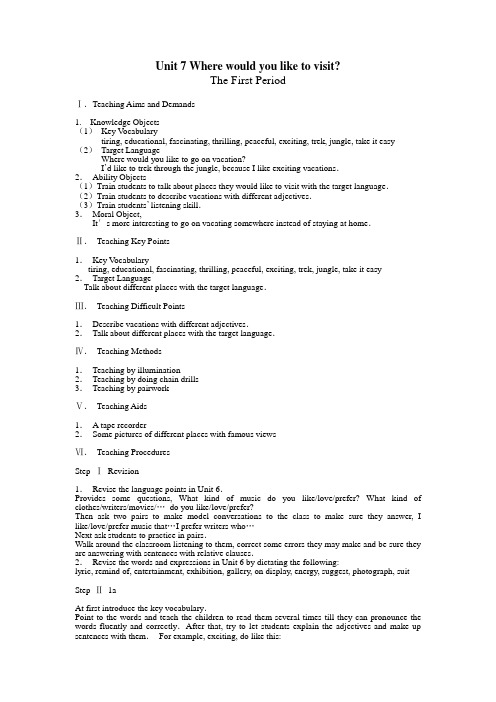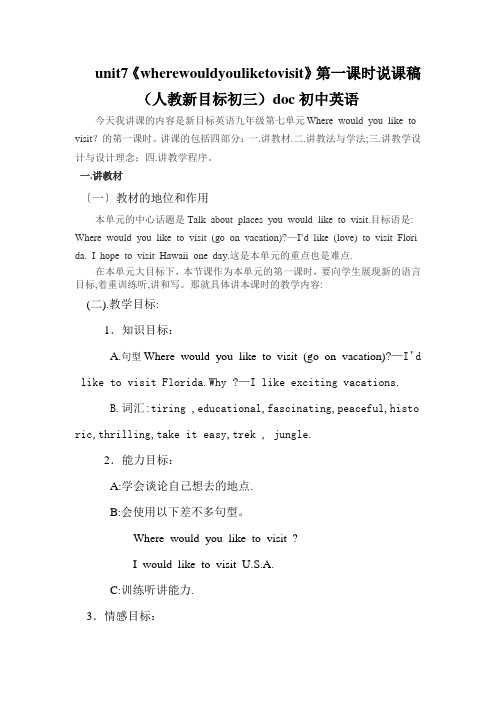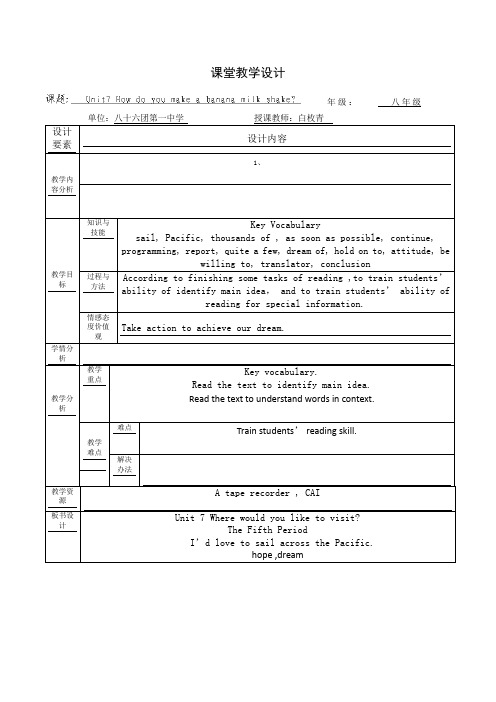Unit7where would you like to visit教学反思
九年级英语全册 Unit 7 Where would you like to visit

(1) How peaceful it is in the country !在乡村是何等宁静啊!
(2)We ne ed peace instead of war .咱们需要和平而不是战争。
试探:peaceful的名词形式是_____________,意为______________
6.______________you like to have a dance with me?
7.——What’s the ________like there?
——It’s sunny.
探讨案
一、.听1b,完成(1)(2)小题:
(1)What would Sam like to do ?
A.Going trekking in t he Amazon jungle inBrazil.
二.语法聚焦
你能总结其中的规律吗?
1.——Where would you like to visit?
你想到哪里旅行?
——I’d like to go somewhere relaxing.
我想去令人放松的地址。
2.——Where would you like to go on vacation?
你想到哪里度假?
(3)——Where would you like to go on vacation ?你想要去哪里度假?
——I’d like to qo trekking in the mountain.我想要到山上徒步旅行。
试探:由例句可知trek的此刻分词与过去式别离是__________和________________,trek常组成的短语有_____________________“穿越……..”和___________________“去徒步旅行”。
Unit 7 Where would you like to visit教学设计

Unit 7 Where would you like to visit?The First PeriodⅠ.Teaching Aims and Demands1. Knowledge Objects(1)Key Vocabularytiring, educational, fascinating, thrilling, peaceful, exciting, trek, jungle, take it easy(2)Target LanguageWhere would you like to go on vacation?I’d like to trek through the jungle, because I like exciting vacations.2.Ability Objects(1)Train students to talk about places they would like to visit with the target language.(2)Train students to describe vacations with different adjectives.(3)Train students’ listening skill.3.Moral Object,It′s more interesting to go on vacating somewhere instead of staying at home.Ⅱ.Teaching Key Points1.Key Vocabularytiring, educational, fascinating, thrilling, peaceful, exciting, trek, jungle, take it easy 2.Target LanguageTalk about different places with the target language.Ⅲ.Teaching Difficult Points1.Describe vacations with different adjectives.2.Talk about different places with the target language.Ⅳ.Teaching Methods1.Teaching by illumination2.Teaching by doing chain drills3.Teaching by pairworkⅤ.Teaching Aids1.A tape recorder2.Some pictures of different places with famous viewsⅥ.Teaching ProceduresStep ⅠRevision1.Revise the language points in Unit 6.Provides some questions, What kind of music do you like/love/prefer? What kind of clothes/writers/movies/…do you like/love/prefer?Then ask two pairs to make model conversations to the class to make sure they answer, I like/love/prefer music that…I prefer writers who…Next ask students to practice in pairs.Walk around the classroom listening to them, correct some errors they may make and be sure they are answering with sentences with relative clauses.2.Revise the words and expressions in Unit 6 by dictating the following:lyric, remind of, entertainment, exhibition, gallery, on display, energy, suggest, photograph, suit Step Ⅱ1aAt first introduce the key vocabulary.Point to the words and teach the children to read them several times till they can pronounce the words fluently and correctly.After that, try to let students explain the adjectives and make up sentences with them.For example, exciting, do like this:Let’s try to explain some new adjectives in our own words and make up some sentences now.See exciting first.Who can explain it in your own words in English?What does exciting mean?Help the children to explain it.Exciting means not boring, or means hard to be quiet.Who can make up a sentence with it?Give an example sentence with it, please.Ask several ones to say their sentences to the class.For example,Surfing makes us exciting.The boy is very exciting when he is watching a football match.Tell students to look at the posters in the picture and compare them.We can see three posters.Tell me what you can see in each one.Then discuss the three posters with students.For Poster One, help students to say, It is a beach.A man with sunglasses is sleeping, etc.Do the same to the other two posters.Read the words on each poster to students and then let them read together several times.Ask some ones to tell the Chinese meanings of the words to see if they can understand them.Do some explanation if necessary.Call the students’ attention to the chart.Point to vacation 1,2 and 3 in the chart.Say, Let’s choose the adjectives from the box for the three vacations.The adjectives you choose should correspond with the posters.Now let’s use Vacation 1 as a sample.Which adjectives should we choose? Who can tell me?Then ask several students to tell the class the words they’ve chosen.Write down their answers on the blackboard like this:Vacation 1 Take it easy on a Florida beach!Adjectives: relaxing, peaceful, boringWho has got some other adjectives to describe it? Some other adjectives you know, but not in the box?Ask some to say more besides the ones in the box, such as quiet, lazy.Write them on the blackboard, too.Please fill in the chart with the adjectives now.Note to match the posters.Get them to fill in the answers by themselves.As they work, move around the room checking their progress and answering questions they may have.Check the answers.Show students some pictures of some famous places, and ask:” where do you like to visit, why?”Have students discuss the question then give their answers.Step Ⅲ1bWe’ll listen to three students talking about where they would like to go on vacation and why.See the sample answers in the chart.Write your answers like that while you hear.Look at the three posters in Activity la and do this part.Each one of the three students, Sam, Gina and Linda, wants to go to one of the three places.Play the tape for the first time, and tell the students not to write in a hurry, just try to catch the main idea of the dialogue.Then play the recording again.Ask them to write their answers this time.Check the answers.Step Ⅳ1cPresentate this dialogue, showing some pictures of the places with great interest all over the world and say like this:I’d like to travel to France.I’d love to visit Paris, because I like relaxing vacations.Where would you like to go on vacation, Sam?Ask one student to answer the question.After that let him or her ask another student.Set off a chain drill like this:T: I’d love to visit Paris, because I like relaxing vacations.Where would you like to go on vacation, S1?S1:I’d like to climb Mount Tai, because I like dangerous vacations.Where would you like to go on vacation, S2?S s :I prefer to travel to the USA, because I like exciting vacations.Where would you like to go on vacation, S3?S3…After a team finished get the children to make their own conversations in pairs.Ask two students to read the example in the speech bubbles in Activity la.Tell them to talk about the posters with their partners this time.As students work together, move around the classroom, offering language support as needed.Ask some pairs to say their conversations to the class.Step ⅤSummaryIn this class, we’ve learned some adjectives that are used to describe vacations and some other words.We have also learned the target language—Where would you like to go on vacation? I’d like to trek through the jungle because I like exciting vacations.Step ⅥHomework1.Try to remember the new key vocabulary.2.Write out three similar conversations to the example in the picture in Activity 1a.Step ⅦBlackboard Design。
鲁教版英语八下Unit 3《Where would you like to visit》教学设计

鲁教版英语八下Unit 3《Where would you like to visit》教学设计一. 教材分析鲁教版英语八下Unit 3《Where would you like to visit》主要讲述了关于旅游的话题,通过介绍不同地方的风土人情,引导学生进行交流和讨论。
本节课的主要内容包括:词汇的学习,如tourist destination, famous place, historical site等;句型的学习,如“Where would you like to visit?”, “I’d like to visit…”; “Why?”等。
通过对本节课的学习,学生能够更好地运用英语进行旅游话题的交流。
二. 学情分析学生在学习本节课之前,已经掌握了基本的英语语法和词汇,具备一定的听说读写能力。
但是,对于一些旅游相关的词汇和表达方式可能比较陌生,需要通过课堂学习来掌握。
同时,学生对于旅游话题可能存在不同的兴趣和看法,可以通过课堂讨论来激发学生的学习兴趣。
三. 教学目标1.知识目标:学生能够掌握旅游相关的基本词汇和表达方式,如tourist destination, famous place, historical site等;学生能够运用所学句型进行旅游话题的交流。
2.能力目标:学生能够通过听说读写的方式,提高自己的语言运用能力;学生能够通过课堂讨论,提高自己的合作能力和思维能力。
3.情感目标:学生能够对旅游话题产生兴趣,增强学习的积极性;学生能够通过学习,了解不同地方的风土人情,拓宽自己的视野。
四. 教学重难点1.重点:旅游相关的基本词汇和表达方式,如tourist destination,famous place, historical site等;运用所学句型进行旅游话题的交流。
2.难点:对于一些旅游相关词汇的准确理解和运用;在实际交流中,能够灵活运用所学句型,表达自己的观点和想法。
unit7《wherewouldyouliketovisit》第一课时说课稿(人教新目标初三)doc初中英语

unit7《wherewouldyouliketovisit》第一课时说课稿(人教新目标初三)doc初中英语今天我讲课的内容是新目标英语九年级第七单元Where would you like tovisit?的第一课时。
讲课的包括四部分:一.讲教材.二.讲教法与学法;三.讲教学设计与设计理念;四.讲教学程序。
一.讲教材〔一〕教材的地位和作用本单元的中心话题是Talk about places you would like to visit.目标语是:Where would you like to visit (go on vacation)?—I’d like (love) to visit Flori da. I hope to visit Hawaii one day.这是本单元的重点也是难点.在本单元大目标下,本节课作为本单元的第一课时,要向学生展现新的语言目标,着重训练听,讲和写。
那就具体讲本课时的教学内容:(二).教学目标:1.知识目标:A.句型Where would you like to visit (go on vacation)?—I’d like to visit Florida.Why ?—I like exciting vacations.B.词汇:tiring ,educational,fascinating,peaceful,histo ric,thrilling,take it easy,trek , jungle.2.能力目标:A:学会谈论自己想去的地点.B:会使用以下差不多句型。
Where would you like to visit ?I would like to visit U.S.A.C:训练听讲能力.3.情感目标:通过对本课的学习,增强实际交际能力,开阔视野,加深对世界各地的地理环境,风土人情,人文教育的了解,自觉地爱护地球,爱护环境.并让学生向往旅行.(三).重点和难点:1.重点:依照新目标对口语会话能力的要求,本课重点为:把握有关国家或地点的词汇和描画景点的形容词,能比较流利地描述一个自己想去的地点,灵活地运用句型Where would you like to visit?—I would like to visit…2.难点:依照实际情形,我认为本单元的难点有两方面:A:如何从地图中熟练地找出学过的国家和都市所在的地理位置。
新疆生产建设兵团第五师八十六团第一中学九年级英语教案Unit7《Wherewouldyouliketovisit》第五课时

课堂教学设计年级:八年级单位:八十六团第一中学授课教师:白枚青设计要素设计内容教学内容分析1、教学目标知识与技能Key Vocabularysail, Pacific, thousands of , as soon as possible, continue, programming, report, quite a few, dream of, hold on to, attitude, bewilling to, translator, conclusion过程与方法According to finishing some tasks of reading ,to train students’ability of identify main idea, and to train students’ ability ofreading for special information.情感态度价值观Take action to achieve our dream.学情分析教学分析教学重点Key vocabulary.Read the text to identify main idea.Read the text to understand words in context.教学难点难点Train students’ reading skill.解决办法教学资源A tape recorder , CAI板书设计Unit 7 Where would you like to visit?The Fifth PeriodI’d love to sail across the Pacific.hope ,dream。
九年级英语公开课课件Unit-7-Where-would-you-like-to-visit-全单元

合并为 I like places. 一句 The weather of the places is warm.
I like places where the weather is warm.
九年级英语公开课课件Unit-7Where-would-you-like-to-visit-全单
元高效实用
有趣味的
fun
迷人有吸引力的 fascinating
令人震颤激动的 thrilling
Niagara Falls 尼亚加拉瀑布 [nai’ægərə]
累人的
tiring
危险的
dangerous
2. Paris doesn’t have any beaches or mountains.
YES
3.You’d better go with someone who can translate things for you because people in Paris can’t speak English.
cost
某物 + cost +某人+钱
① 这只手表花了我200元。 This watch _co_s_t__me 200 yuan .
② 作业要花孩子们许多时间。 Homework _c_os_t_s_the children much time.
3. It’s convenient ( for sb.) to do sth.
My sister hopes to be a doctor one day.
2a Listen and number these statements in the order that you hear them. 3 I love places where the people are really friendly.
语言知识讲解-Unit 7 Where would you like to visit 教材全析
教材全析[教材全析]友情提示SECTION ALanguage Goal: Talk about places you would like to visit.语言目标:谈论你想参观访问的地方。
1a Write adjectives to describe the three vacations in the picture below. Use adjectives from the box and other adjectives you know.使用框中的或者你所知道的其他形容词写出下表中描述三个休假的形容词。
Where would you like to go on vacation, Sam?萨姆,你想到哪里去度假?I’d like to trek through①the jungle②,because I like exciting vacations.我想穿越丛林,因为我喜欢激动人心的假期。
(1)would是情态动词,和like一起连用时,同want或hope 的含义是一样的。
含有would like的句子的一般疑问句、否定句的变化方法如下:Would you like to join us in the party?你想参加我们的聚会吗?I wouldn’t like to go out with you.我不想跟你出去。
(2)go on vacation表示“去度假”,而be on vacation表示“在度假”。
(3)trek作动词时的基本含义是进行艰苦的长途旅行。
1b Listen. Where would Sam, Gina, and Lydia like to go on vacation? Why? Fill in the chart.听录音。
萨姆、吉娜和丽达想到哪里去度假?为什么?填入图表中。
1c Look at the vacation posters in activity 1a.Practice conversations with your partner. Then tell which place you would like to visit and why.看活动1a中的假期海报。
Unit 7 Where would you like to visit教学流程
Cangjie Junior Middle School
(昌邑市围子镇仓街初中)
Zhang Yanxing (张延兴)
Greeting
• Hi ! How do you do ? My name is Zhang Yanxing . I am from Yinma Junior Middle School . We get to know today and you become my students . I hope we can be good friends in the future .OK ?
It is spring here every day!
“东方明珠”—— Hong Kong 咱中国人
的骄傲
• • • •
Hong Kong very crowded interesting great entertainment
墨西哥城 ——世界上人口最多的城市
• • • • Mexico City relaxing exciting lots to do
• Take it easy ! Let’s go over the new words and expressions first .
海阔凭鱼跃, 天高任鸟飞。 外语学不好, 你会很无奈!
先攻克 单词堡 垒,咱 心里就 不慌了!
New words and expressions
1.touristy 游客很多的;适合旅行的 tourist 游客 Paris is touristy . There are lots of tourists every year 2.spotlight 公众注意中心 travel spotlight 旅游胜地 3.consider 考虑;认为 ;( 意为“仔细考虑,深思熟虑,再三考 虑”,后面可接名词,从句,副词,接动词时要用v-ing形 式。) consider doing sth. 考虑干某事 4. lively 活泼的;活跃的; a lively city one of the liveliest cities in Europe 5. Eiffel Tower . 埃菲尔铁塔Eiffel Tower stands for Paris .
Unit7Wherewouldyouliketovisit教案12
The Fourth PeriodⅠ.Teaching Aims and DemandsObjects(1)Key Vocabularycustomer,save money,pool,culture,dream vacation(2)Target LanguageWhere would you like to go?I’d like to go somewhere warm.Objects(1)Train students’listening ability.(2)Train students to use the target language in oral English properly.ObjectTo role play the conversations you’ve heard is a very good way to improve your oral English.Ⅱ.Teaching Key PointTrain students’listening skill by listening to the conversations with t he target language.Ⅲ.Teaching Difficult PointHelp students to role play the conversations.Ⅳ.Teaching Method s.method..Ⅴ.Teaching AidA tape recorder.Ⅵ.Teaching ProceduresStep Ⅰ Revisionthe passage about Singapore by asking two or three students to read it to the sure that they pronounce each word correctly.Then let students read it aloud once by themselves.the short compositions they have written at let several ones read theirs to the ,get them to work in pairs to check the last,collect al l students’ them over carefully after class.Step Ⅱ Part 1This activity reviews the target language and introduces key vocabulary.Read the instructions to brainstorm like this:To brainstorm a list of things means you should write down all the ideas that come into your minds.Now brainstorm a list of things that are important to you when you go on them down in your exercise should not worry if an idea is silly or if a word is spelled can even write a word in their first language for the moment.Ask them to have a look at the two model phrases the book provides before they around the room offering language support as needed.After about three minutes,tell them to stop writing and thinking.Let’s review the ideas you’ve thought of will correct spell ing and find the correct English words for any words you don’t know.Then ask some children to read their lists to the any new words or phrases they have used on thethem to discuss the lists in groups of one reads his or her own list to the other they discuss the words or phrases there is something that they are not sure,tell them to show me by putting up their around the room and solve the problems they may students find the correct English words to express their ideas.Step Ⅲ 2aThis activity gives students practice in understanding the target language in spoken conversation. Read the instructions to them to guess the meaning of travel agency explain it like this:If you plan to have a trip or vacation,you can go to a travel travel agency is an office that can help you make travel they help you get plane tickets and hotel present whale watch and amusement park to the class like whale watch tour means you stay in a ship and go out to the oceaning during the time of year when the whales are migrating,and then you can see them park means a place like can do lots of rides and play lots of games there.Write the two phrases on the blackboard.Look at the three pictures in Activity 2a know Jeff has a summer job at a travel will hear him talking on the phone with three different you see the small box in the corner of each picture?Listen to the conversations and number the a proper number in each box to show the right order of the play the tape for the first them only to the tape a second they listen to the tape this time,have students number the pictures.Check the answers.AnswersThe pictures should be numbered in the following order:1,2,3Step Ⅳ2bThis activity gives students practice in understanding and writing the target language.Read the instructions to students.Tell them to look at the read the headings Customer,Wants,Doesn’t want and point out the blanks under each let them see the sample answer under Wants in the them to read it ,Then first customer wants to go somewhere warm.I’ll play the tape write down the things the three customers want and don’t want in this chart as you listen to the tape.The play the tape fill in the blanks with the words they the tape several times to give students time to fill out the chart.Correct the answers.AnswersCustomer 1 wants:to go somewhere warm,doesn’t want to flyCustomer 2 wants:to go on a nature tour,doesn’t want to go anywhere coldCustomer 3 wants:to go somewhere that’s fun for kids,doesn’t want to go to a big cityStep Ⅴ 2cThis activity provides guided oral practice using the target language.Read the instructions to students.Say,In this activity,you are asked to role play Jeff’s conversation with the information in the chart in Activity 2b.Ask a pair of students to read the sample conversation to the class.S a:Where would you like to go?S b:I’d like to go somewhere warm.S a:Where else can you tell me?S b:I don’t want to go to a place which is too far away.Then ask them to continue some help if example,they may say like this,S a:Where would you like to go?S b:I’d like to go somewhere warm.S a:What else can you tell me?S b:I don’t want to go anywhere too hot.Offer more phrases,...to go to a small town,...to go by ship,...to go to a place which is too crowded,...to travel by plane,...to go to anywhere too far, them on the blackboard.Then ask students to practice in around the room checking the progress of the pairs and offering help as one or two pairs to say their conversations to the any mistakes they may have made. Step ⅥSummarySay,In this class,we’ve done lots of listening practice on target language,and we’ve also written and spoken some.Step Ⅶ Homeworkout the phrases you have brainstormed in Activity 1.down the conversation in Activity 2c.Step ⅧBlackboard DesignUnit 7Where would you like to visit?Section BThe Fourth PeriodThe answers to Activity 2b:Customer 1wants:to go somewhere warm,doesn’t want:to flyCustomer 2 wants:to go on a nature tour,doesn’t want:to to anywhere coldCustomer 3 wants:to go somewhere that’s fun for kinds,doesn’t want:to go to a big citySome phrases for Activity 2c:to go to a small townto go by shipto go to a place where is too crowdedto travel by planeto go to anywhere too far。
新目标Unit 7 Where would you like to visit教学设计
新目标Unit 7 here uld u lie t visit教学设计
Unit7hereuldulietvisit新标要求 词组1trethrugh长途跋涉 2taeiteas从容3ingeneral通常,大体上 4seda某一天 assnaspssible尽快地 6etrue实现 7thusandsf数千
8sthat以便,为了9quiteafe颇多的 0nthetherhand另一方面11hldn坚定日常交际用语 hereuldulietvisit? I’dlvetvisitexi hatelseanutelle? IhpetgtFraneseda Ianttgtsehererealll!重点句型 I’dliettrethrughtheungle,beauseIlieexiting vaatins I’dlietgsehererelaxing IhpetvisitHaaiiseda Frurnextvaatin,hntnsidervisitingParis? edn’tindhfarehavetg 知识点全解 hereuldulietgnvaatin,Sa? Sa,你想到哪儿去度假? (1)句中的uldlie表示“想要”,是一种较委婉礼貌的说法,常用于以下几种句式: <1>uldlie+名词(或代词),意为“想要”。例如: I’dlieaneputer 我想要一台新计算机。(其中I’d是Iuld的缩写) He’dliesehaburgeranduie 他想要汉堡包和果汁。(其中He’d是Heuld的缩写) <2>uldlie+td,意为“想做……”。例如: She’dlietgtherealne 她想单独去那里。 e’dlietseeurteaherinhspitalthisSunda 这个星期天,我们想去看看住院的老师。 <3>uldlie+名词(或代词)+td,表示“希望……做……”。例如: I’dlieuteetfriends 我希望你见见我的朋友们。 I’dliethetstafrdinnerithus 我希望他们留下来和我们共进晚餐。 <4>uldlie+名词(或代词)+形容词,意为“喜欢…… 呈……状”。例如: I’dlietheindspenatnight 晚上(睡觉)我喜欢开着窗户。 I’dliethistrublesettledatne 我希望这麻烦事能马上得以解决。 (2)辨析:uldlie与ant 二者都有“想要”的含义,但uldlie较ant更加委婉。二者后面都可接“名词或不定式”,也可接“名词+不定式”的结构,uldlie在口语中常说成“’dlie”,可适用于所有人称;而ant则要根据人称和数的变化而变化。在语言表达中,二者大多可以互换使用,但在语气的委婉程度上是有差别,这一点在具体的语言环境中要注意。例如: Sheantsaupfffee =She’dlieaupfffee 她想要一杯咖啡。 Hisunleuldlietbuanear =Hisunleantstbuanear 他叔叔想买辆新车。 friendsanttplaseraftershl =friendsuldlietplaseraftershl 我的朋友想在放学后踢足球。 (3)nvaatin意为“在度假,在休假中”,这主要是美式用法,英国人常用nhlida其中的介词n是表示状态、方法等,意思是“进行中,在……中,于……状态”。例如: TheSithfailisnnvaatin 史密斯一家正在度假。(也可用nhlida) unlehasgnetFranenvaatin(hlida) 我叔叔到法国去度假了。 Therearealtfnespringsuitsnsaleintheshp 这个商店里有许多新上市的春装在出售。 Sheetanldfriendnheratshl 在上学的途中,她遇到了一位老朋友。 (4)g+n(或fr)+名词,常表示“去……”。例如: Let’sgnaurnenaDa “五·一”节我们去旅行吧。 The’dlietgnapinithiseeend 这个周末他们想去野餐。 uldulietgfrasiaftershl? 放学以后你想去游泳吗? Let’sgfraalaftersupper 晚饭后我们去散步吧。 2I’dliettrethrughtheungle,beauseIlieexitingvaatins 我想去热带丛林中旅行,因为我喜欢充满刺激的假期。 (1)辨析:thrugh与arss 二者都可译为“穿过”,但thrugh是指从空间较狭窄的一头“穿”行到另一头,常指从事物(氛围)内部穿过,含义与in有关系。 arss是指从一条线或某一事物的表面的一边到另一边,常可译为“横过”,“横穿”,含义与in有关。例如: Thetrainisrunningthrughthetunnel 火车正从隧道中穿过。 Tfriendserealingthrughthefresthentheetabear 两个朋友穿过一片森林时,突然遇到了一只熊。 It’sdangerustgarsstheradhentraffilightsarered 红灯亮时过马路很危险。
- 1、下载文档前请自行甄别文档内容的完整性,平台不提供额外的编辑、内容补充、找答案等附加服务。
- 2、"仅部分预览"的文档,不可在线预览部分如存在完整性等问题,可反馈申请退款(可完整预览的文档不适用该条件!)。
- 3、如文档侵犯您的权益,请联系客服反馈,我们会尽快为您处理(人工客服工作时间:9:00-18:30)。
Unit7 Where would like to visit?教学反思
----任兰
本节课为第七单元第三课时,重在提高学生的口语和听力,通过操练,
使学生能够熟练运用目标语言为他人提供帮助。课程的总体设计体现
了新课标中从学生的学习兴趣,生活体验和认知水平出发,倡导体验、
实践、参与、合作与交流的学习方式和任务型的教学途径的教学理念。
以培养学生的综合语言运用能力为目标。教师在课堂教学中采用“任
务型”学习方式,使学生带着明确的任务目标,积极主动地进行学习。
在执行任务的过程中,学生通过实践、思考、调查、讨论、交流和合
作等方式学习和使用英语,完成学习任务。 因此,在这堂听说课中,
我注重学生的听说练习,注重学生的听说技能的培养。学生对所布置
的任务能积极主动地完成,特别在小组任务中,组员间的团结协作能
力也发挥得非常好。学生通过组员之间的练习,不仅加强了口语的训
练,而且培养了学生的团结合作精神。
在整节课的教学中,大部分学生能够积极参与,并乐于互相合作,
能主动用英语与对方交流。通过老师的指导和联系,能够理解新词汇
和句型,并能使用目标语言。一些较好的学生还能够创造性的完成任
务。然而,教学过程中也暴露了不少问题,课堂设计的部分环节缺乏
适当及时的教学评价,使部分中等学生缺乏学习动力。其次,新课前
的复习准备不够充分。部分较差学生不理解任务要求,导致他们在小
组活动中缺乏主动性,而此时,教师也没有及时给予帮助和引导。
针对于这节课出现的一些问题,在今后的教学设计中,我要了解
学生的个体差异,对不同程度的学生设计不同水平的问题,使每个学
生都能够参与到课堂活动中来。同时,及时鼓励学生,帮助他们树立
学习的自信心,激发他们对英语的学习兴趣。最后,课前的准备工作
要做充分,根据需要可适当调整课程设置,使每个教学环节能够自然
过渡,紧密衔接。
从学生完成课后任务的反馈情况来看,学生的描述词汇数量有
限,由此教师在教学中应加大词汇量,并教会学生学习整理词汇。
利用多媒体辅助教学,可以吸引学生的眼球,但有些学生只顾看而忘
记做笔记,花费的时间比较多。所以以后 视频剪辑方面可以再出色
点,内容可以再紧凑些,占用的时间可以节约些。
总之,在教学过程中需要我们教师适时适当的引导,通过有效地
设计来引导学生,使他们始终处于主动寻求知识的渴望。充分让学生
发挥其主体地位,使其真正成为课堂的主人。
